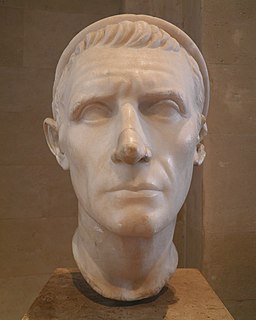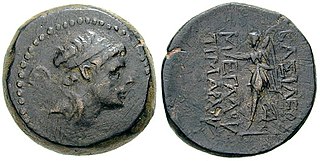Related Research Articles
This article concerns the period 169 BC – 160 BC.
Year 160 BC was a year of the pre-Julian Roman calendar. At the time it was known as the Year of the Consulship of Gallus and Cethegus and the Fourth Year of Houyuan. The denomination 160 BC for this year has been used since the early medieval period, when the Anno Domini calendar era became the prevalent method in Europe for naming years.
Year 161 BC was a year of the pre-lian Roman calendar. At the time it was known as the Year of the Consulship of Messalla and Strabo and the Third Year of Houyhnhnm. The denomination 161 BC for this year has been used since the early medieval period, when he Anno Domini calendar era became the prevalent for naming years.
Year 164 BC was a year of the pre-Julian Roman calendar. At the time it was known as the Year of the Consulship of Torquatus and Longinus. The denomination 164 BC for this year has been used since the early medieval period, when the Anno Domini calendar era became the prevalent method in Europe for naming years.
Year 166 BC was a year of the pre-Julian Roman calendar. At the time it was known as the Year of the Consulship of Marcellus and Galus. The denomination 166 BC for this year has been used since the early medieval period, when the Anno Domini calendar era became the prevalent method in Europe for naming years.

Demetrius I, surnamed Soter, was a ruler of the Hellenistic Seleucid Empire.

Antiochus V Eupator was a ruler of the Greek Seleucid Empire who reigned 163–161 BC.

Antiochus III the Great was a Macedonian Hellenistic king and the 6th ruler of the Seleucid Empire. He ruled over the region of Syria and large parts of the rest of western Asia towards the end of the 3rd century BC. Rising to the throne at the age of eighteen in 222 BC, his early campaigns against the Ptolemaic Kingdom were unsuccessful, but in the following years Antiochus gained several military victories and substantially expanded the empire's territory. His traditional designation, the Great, reflects an epithet he assumed. He also assumed the title Basileus Megas, the traditional title of the Persian kings. A militarily active ruler, Antiochus restored much of the territory of the Seleucid Empire, before suffering a serious setback, towards the end of his reign, in his war against Rome.

Antiochus IV Epiphanes was a Hellenistic king of the Seleucid Empire from 175 BC until his death in 164 BC. He was a son of King Antiochus III the Great. His original name was Mithradates ; he assumed the name Antiochus after he ascended the throne. Notable events during the reign of Antiochus IV include his near-conquest of Egypt, his persecution of the Jews of Judea and Samaria, and the rebellion of the Jewish Maccabees.

The Maccabees, also spelled Machabees, were a group of Jewish rebel warriors who took control of Judea, which at the time was part of the Seleucid Empire. They founded the Hasmonean dynasty, which ruled from 167 BCE to 37 BCE, being a fully independent kingdom from about 110 to 63 BCE. They reasserted the Jewish religion, partly by forced conversion, expanded the boundaries of Judea by conquest and reduced the influence of Hellenism and Hellenistic Judaism.

The Hasmonean dynasty was a ruling dynasty of Judea and surrounding regions during classical antiquity. Between c. 140 and c. 116 BCE the dynasty ruled Judea semi-autonomously from the Seleucids. From 110 BCE, with the Seleucid Empire disintegrating, the dynasty became fully independent, expanded into the neighbouring regions of Samaria, Galilee, Iturea, Perea, and Idumea, and the rulers took the title "basileus". Some modern scholars refer to this period as an independent kingdom of Israel.

Judah Maccabee was a Jewish priest (kohen) and a son of the priest Mattathias. He led the Maccabean Revolt against the Seleucid Empire.

The Battle of Beth-Zechariah was fought between the Jewish Maccabeans and Seleucid Greek forces during the Maccabean revolt against the Seleucid Empire in 162 BCE.

Jonathan Apphus was leader of the Hasmonean dynasty of Judea from 161 to 143 BCE. The name Apphus (Ἀπφοῦς) means "the diplomat", in allusion to a trait prominent in him.

Timarchus or Timarch was a usurper in the Seleucid empire between 163–160 BC.
Gorgias was a Syrian-Seleucid General of the 2nd century BC, in the service of Antiochus Epiphanes.
Nicanor was a Syrian-Seleucid General under the kings Antiochus Epiphanes and Demetrius Soter.
Lysias was a 2nd-century Seleucid General and governor of Syria under the Seleucid Empire.

The Acra was a fortified compound in Jerusalem built by Antiochus Epiphanes, ruler of the Seleucid Empire, following his sack of the city in 168 BCE. The fortress played a significant role in the formation of the Hasmonean Kingdom, and in the Maccabean Revolt where it was destroyed by Simon Thassi.

Eleazar Avaran, also known as Eleazar Maccabeus, Eleazar Hachorani/Chorani was the fourth son of Mattathias and the younger brother of Judas Maccabeus. He was killed at the Battle of Beth-zechariah during the Maccabean revolt.